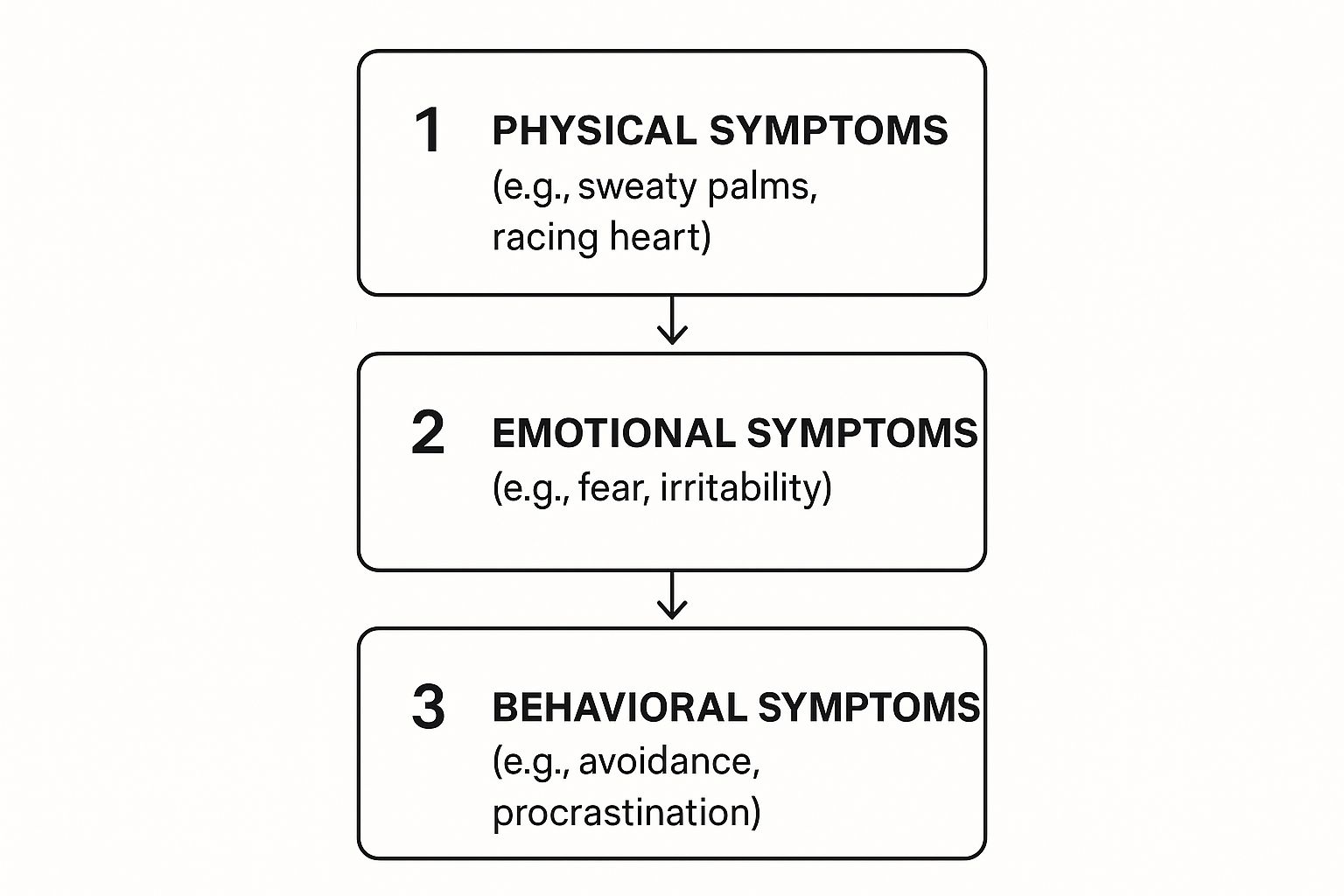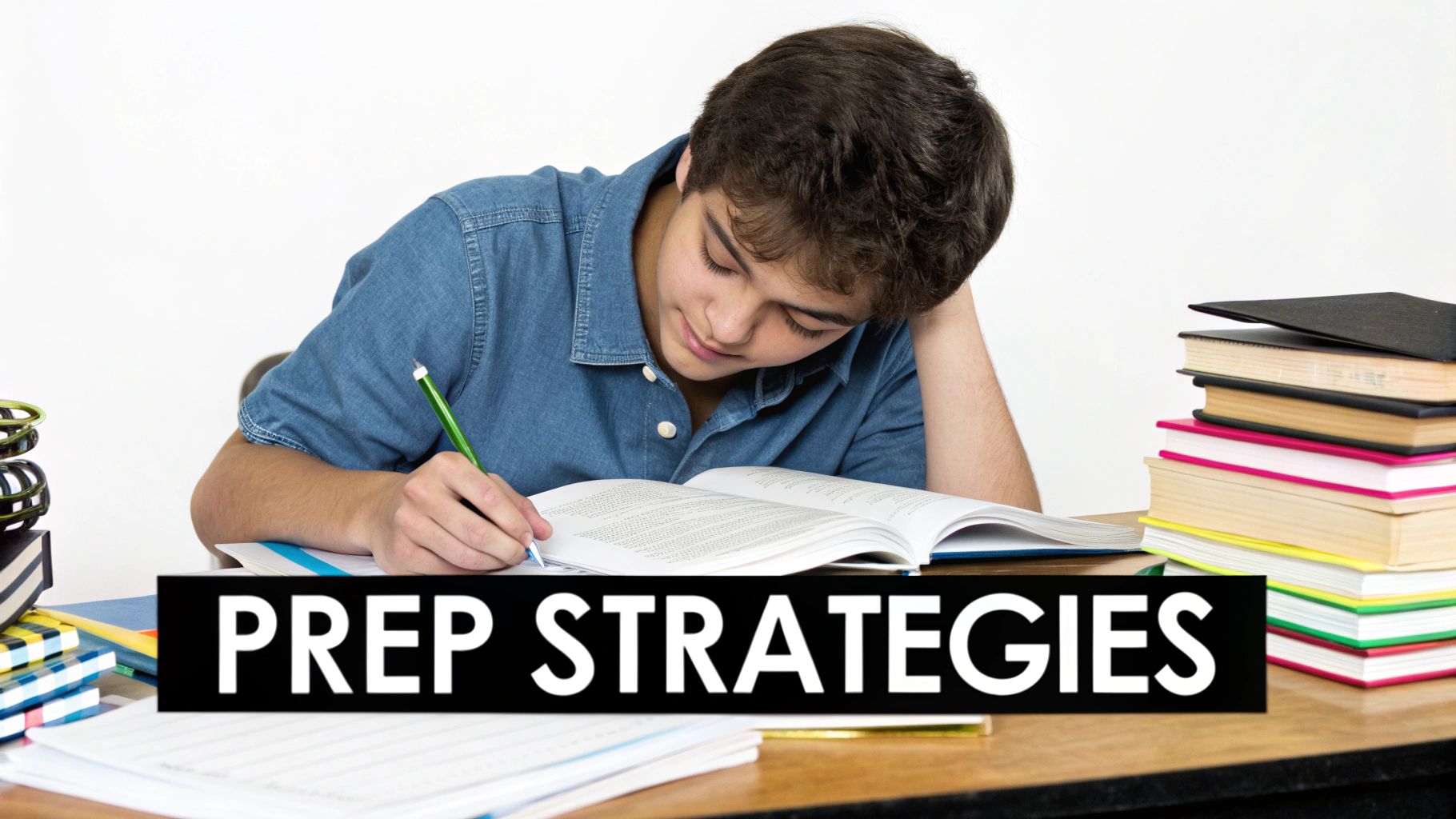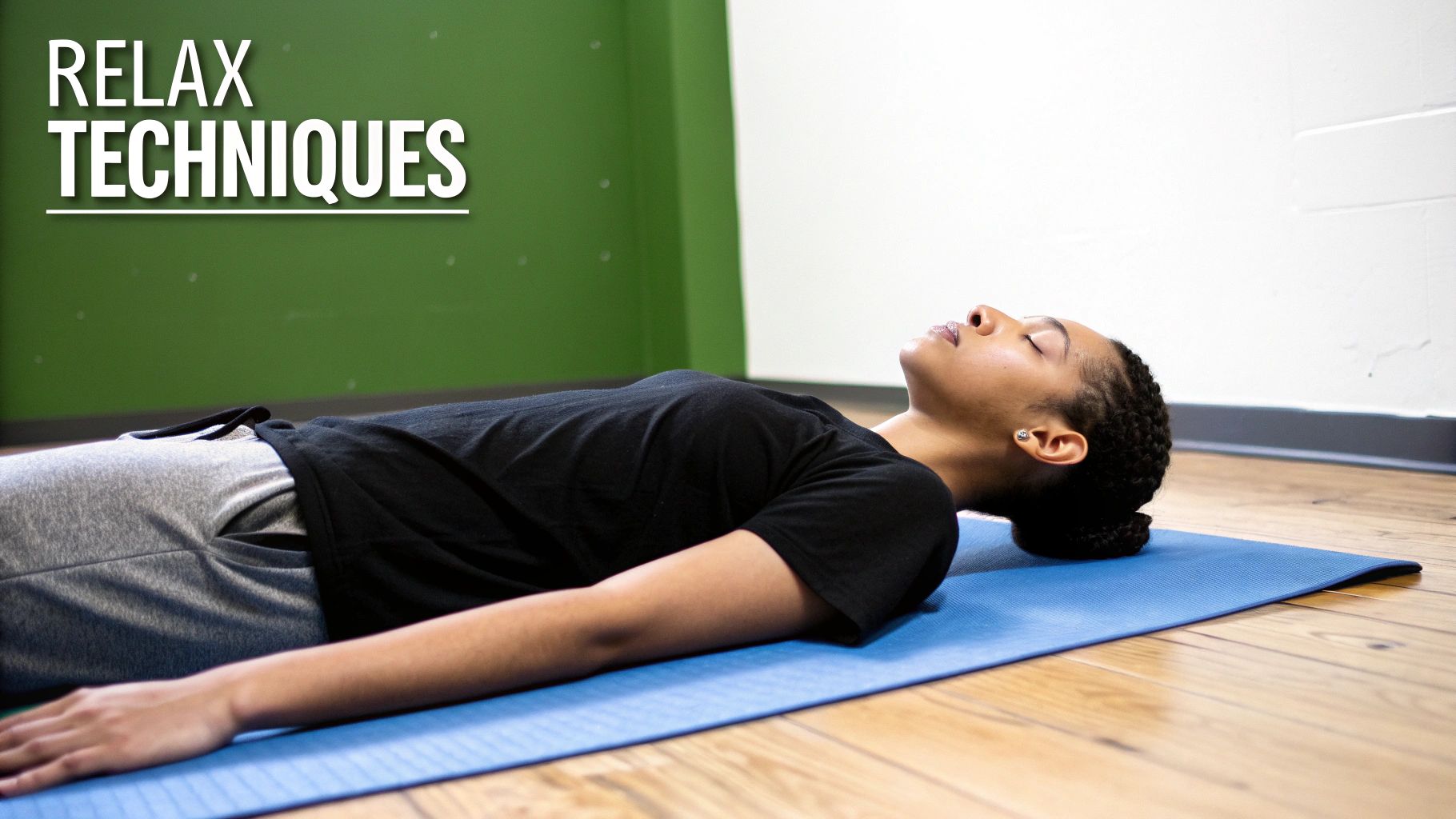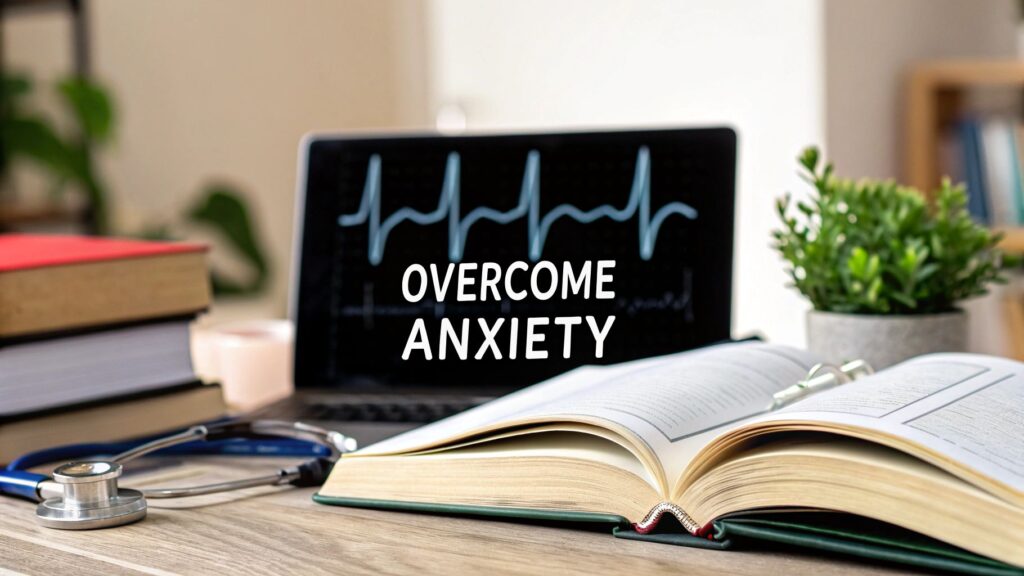Feeling a little keyed up before a massive exam is one thing. We all get that. But overcoming real test anxiety—the kind that freezes your brain and makes your heart pound—is a different beast entirely. You get there by combining smart study habits, key mindset shifts, and a few clutch techniques for when you're in the hot seat.
This isn't about pretending stress doesn't exist. It's about learning to manage it so you can actually show what you know.
What Is Test Anxiety and Why Does It Happen?
Let's be clear: a few butterflies before a high-stakes medical exam are perfectly normal. It shows you care. But when those butterflies turn into a stampede—a racing heart, runaway thoughts, or a mind that goes completely blank—you've crossed into test anxiety territory. It’s more than just "stress." It's a specific type of performance anxiety where your mind and body go into full-on crisis mode over the pressure of the test.
Getting a handle on this is the first step to beating it. Test anxiety isn't a character flaw or a sign of weakness. Think of it more as a learned response to a major perceived threat. And let's face it, an exam that can shape your entire career feels like a pretty big threat.
The Cognitive and Physical Symptoms
Test anxiety shows up in two main ways: in your head (cognitively) and in your body (physically). Spotting these symptoms is the key to knowing when to deploy your strategies to overcome it.
- Cognitive Symptoms: This is the flood of negative self-talk, the "what if" spirals ("If I fail this, my career is over"), and the inability to concentrate. You might find yourself comparing your progress to everyone else's or, most frustratingly, drawing a total blank on material you knew inside and out just yesterday.
- Physical Symptoms: This is your body's classic fight-or-flight response kicking into overdrive. We're talking a rapid heartbeat, sweaty palms, shortness of breath, nausea, or that dreaded pit in your stomach. Some people even get shaky or feel lightheaded.
The crucial thing to realize is that these symptoms feed each other. The physical panic fuels the negative thoughts, which then makes the physical sensations even worse. It's a vicious cycle.
You Are Not Alone in This Experience
If this sounds familiar, you need to know you are far from the only one going through it. The intense pressure cooker of medical exams is the perfect breeding ground for these feelings.
In fact, studies show just how common this is. Research using the Westside Test Anxiety Scale found that while 45.4% of students had low anxiety, 33.2% reported moderate levels, and a significant 14.6% were dealing with high or extremely high anxiety. You can read the full research about these anxiety levels for a deeper dive into the numbers.
This data isn't just a statistic; it's proof that what you're feeling is a shared struggle. Knowing that can take away some of the isolation and give you the power to start taking control.
Build Resilience with Proactive Study Habits
The best way to manage test anxiety isn't a trick you pull out on exam day. It’s a foundation of confidence you build brick by brick, long before you ever sit down for the test. Forget brute-force studying; we're talking about building real resilience through smart, proactive habits.
If your game plan revolves around last-minute cramming, you’re setting yourself up for a world of stress. The real goal is to make those frantic, all-night sessions completely unnecessary. A well-designed study schedule is your first line of defense, breaking down massive amounts of material into shorter, consistent blocks spread throughout the week. This approach not only prevents burnout but also helps your brain actually move information into long-term memory—which is what you need for true mastery.
Adopt Smarter Study Techniques
To really wrap your head around complex medical topics, you have to move beyond just staring at your notes. This is where leaning on evidence-backed study methods makes all the difference in building genuine, unshakable confidence.
Active Recall: Instead of passively rereading your notes, force your brain to pull the information out from scratch. For example, after studying a chapter on cardiac pharmacology, shut the book and write down everything you can remember. This simple act immediately shows you what you actually know versus what just looks familiar.
Spaced Repetition: Our brains are wired to forget. Spaced repetition works with that reality, not against it. By reviewing material at increasing intervals—say, a day later, then a few days later, then a week later—you interrupt the forgetting process and cement the knowledge in place.
These methods are absolute game-changers for high-stakes exam prep. For a much deeper dive, check out our guide on how to use active recall for medical students.
Simulate the Real Exam Environment
A huge chunk of test anxiety comes from the sheer unfamiliarity of it all. The ticking clock, the sterile room, the immense pressure—it can be a shock to the system. You can dramatically lessen that shock by making the unfamiliar, familiar.
Start simulating exam conditions during your practice. Find a quiet space, set a timer, and work through a block of practice questions without any interruptions. That means phone off, no peeking at the answers. The more you can replicate the real testing experience, the more comfortable and prepared you'll feel when it actually counts. You’re essentially desensitizing yourself to the pressure.
Key Takeaway: Simulation isn't just about testing your knowledge; it's about training your psychological response. By repeatedly putting yourself in a controlled-stress environment, you're teaching your nervous system that it can stay calm and perform effectively when the pressure is on.
As you build these proactive habits, it's worth exploring tools that can help. Some students have found that using AI-powered study assistance from tnote helps them organize their notes and streamline their review process, making smart studying even easier.
This infographic breaks down the vicious cycle of test anxiety—how a physical symptom can trigger an emotional response, which then leads to behaviors that just make everything worse.

Understanding this chain reaction—from a racing heart to outright fear to procrastination—is the first step in breaking the cycle.
To help you put these proactive strategies into practice, here is a simple checklist of daily and weekly habits that build long-term resilience against test anxiety.
Pre-Exam Anxiety Prevention Checklist
| Strategy | Frequency | Key Benefit |
|---|---|---|
| Active Recall Session | Daily (15-30 min) | Moves info to long-term memory, boosts confidence. |
| Timed Practice Block | 2-3 times/week | Desensitizes you to time pressure and exam format. |
| Consistent Sleep | Daily (7-9 hours) | Crucial for memory consolidation and emotional regulation. |
| Balanced Nutrition | Daily | Provides sustained energy for optimal brain function. |
| Physical Exercise | 3-5 times/week | A powerful, natural way to reduce stress and clear your head. |
| Weekly Planning | Once/week | Prevents feeling overwhelmed and eliminates last-minute cramming. |
By consistently incorporating these habits into your routine, you fortify both your knowledge and your mindset, making you far more resistant to anxiety when exam day arrives.
Fortify Your Brain and Body
Finally, never forget that your mental resilience is directly tied to your physical health. Neglecting your body while preparing for a major exam is like training for a marathon on a diet of junk food and no sleep—you’re setting yourself up to fail.
Consistent sleep, balanced nutrition, and regular exercise aren't just "nice-to-haves"; they are non-negotiable pillars of any effective study plan. Sleep is when your brain consolidates memories. Good food provides the sustained energy your brain craves. And exercise is one of the most powerful natural stress-reducers available. Weaving these into your routine makes you fundamentally stronger and better equipped to handle the pressure.
Rewire Your Mindset to Reduce Exam Fear

Let's be honest: anxiety is often a battle fought entirely in the mind. The physical symptoms—that racing heart, the sweaty palms—are usually just the fallout from a spiral of negative thoughts. Learning how to overcome test anxiety means learning to step in and challenge these thoughts before they hijack your performance.
This is where principles from Cognitive Behavioral Therapy (CBT) are incredibly powerful. The core idea is simple: your thoughts, feelings, and actions are all connected. If you can change your thought patterns, you can absolutely change how you feel and react under pressure.
Catch and Challenge Negative Thoughts
The first step is simply becoming aware of your internal monologue. Most of the time, anxious thoughts are automatic and feel like undeniable truths in the moment. In CBT, these are known as "cognitive distortions"—irrational thinking patterns that convince us of things that just aren't true.
For medical students, one of the most common distortions is catastrophizing. This is when your mind immediately leaps to the absolute worst-case scenario. It’s a classic.
- A single tough practice question instantly becomes: "I'm going to fail this entire exam."
- Forgetting one small detail balloons into: "I haven't studied enough and I'll never be a competent doctor."
When you catch yourself doing this, you have to actively push back. Ask yourself: What's the actual evidence for this thought? Is there a more realistic, less dramatic way to look at this? This simple act of questioning interrupts the anxiety cycle and pulls you back from the edge.
Reframe Your Inner Monologue
Once you've challenged the distortion, the next move is to replace it with a more balanced, realistic thought. This isn't about slapping on some fake positivity; it's about being accurate.
| Catastrophic Thought | Realistic Reframe |
|---|---|
| "I'm going to fail for sure." | "I've prepared for this. I might not know every single answer, but I can absolutely handle the majority of these questions." |
| "Everyone else understands this but me." | "Everyone struggles with certain topics. I'm strong in other areas, and I can focus on what I do know." |
| "If I mess this up, my career is over." | "This is one exam. It's important, yes, but it doesn't define my entire future or my potential as a physician." |
Building this mental habit of catching, challenging, and reframing your thoughts actually rewires your brain's default response to stress. It grounds your mindset in reality, not fear.
Key Insight: The goal isn't to silence every negative thought. It's to stop believing them unconditionally. When you question their validity, you strip them of their power and gut their emotional impact.
Visualize Success to Build Confidence
Another powerful mental technique is visualization. Don't just hope for the best; mentally rehearse it. Spend a few minutes each day vividly imagining the entire exam process going smoothly.
Picture yourself walking into the testing center feeling calm, focused, and prepared. Imagine sitting down, taking a deep breath, and reading that first question with total clarity. See yourself working through difficult problems logically and confidently recalling information when you need it most.
This mental practice creates a blueprint for success in your mind, making a positive outcome feel more familiar and achievable. Strong visualization can even boost your ability to retrieve information. For more on this, you can explore other strategies on how to improve memory retention in our detailed guide.
Calm Your Nerves During the Exam

No matter how well you prepare, it can still happen. Mid-exam, your heart starts pounding, your focus blurs, and that familiar wave of panic begins to rise. Knowing how to manage test anxiety in that critical moment is everything.
You need a toolkit of discreet, powerful techniques you can use right at your desk without losing precious time. Think of these as your in-the-moment lifelines to regain control and get your head back in the game.
Master Your Breathing to Calm Your Nervous System
When anxiety strikes, your breathing instinctively becomes shallow and rapid, kicking your body’s fight-or-flight response into high gear. The fastest way to short-circuit this is with intentional, deep breathing. It’s a direct signal to your brain that you're safe and in control.
One of the most effective and subtle methods is the 4-7-8 breathing technique. It works by activating your parasympathetic nervous system, which is what helps your body rest and calm down.
Here’s how to do it without anyone noticing:
- Silently exhale completely through your mouth.
- Close your mouth and inhale quietly through your nose for a count of four.
- Hold that breath for a count of seven.
- Exhale completely through your mouth, making a soft whoosh sound for a count of eight.
Repeat this cycle just three or four times. The long exhale is the most important part—it’s what physically slows your heart rate and reclaims your physiological calm.
Use Grounding Techniques to Re-center Your Mind
When your thoughts are spiraling, you need to pull your focus out of the anxiety and back into the present moment. That's what grounding is all about. It anchors you to your physical surroundings and breaks the mental feedback loop of panic.
For immediate relief, you can adapt a variety of rapid calming techniques for the testing environment. A great resource with adaptable ideas is these 7 Tips For Calm Anxiety Fast.
Here’s a simple grounding exercise you can do anytime, anywhere:
- Feel your feet on the floor. Press them down firmly. Concentrate on the sensation of the pressure, the texture of your shoes, and the solid ground beneath you.
- Touch your desk. Place your palms flat on the surface. Notice its temperature—is it cool, smooth, or slightly rough?
- Grip your pen. Hold your pen or pencil tightly. Feel its weight, its shape, and the texture in your hand.
These small sensory inputs force your brain to shift its attention away from anxious thoughts and back to the physical reality of the room. It’s a powerful way to interrupt the panic cycle.
Key Strategy: If you hit a question that sends you into a spiral, don't just stare at it. Take 30 seconds. Do one quick 4-7-8 breath and press your feet into the floor. This mental "reset" is often enough to break the block and let you approach the problem with a clearer head.
Deploy Smart Exam-Taking Strategies
Your approach to the test itself can either feed your anxiety or starve it. When you feel overwhelmed, it's time to shift your strategy on the fly.
Start with what you know. Don't feel trapped into tackling questions in strict numerical order. If question one is a monster, skip it. Hunt for a few questions you feel confident about. Answering even a few correctly builds psychological momentum and restores your sense of competence.
Use positive self-talk. When you hit a mental block, your inner critic might start screaming, "You're failing!" You have to actively replace that with a more constructive thought. Try something like, "Okay, this one is tough. I'll flag it and come back. I know the material for other questions." This isn't about being fake; it’s about being a strategic and supportive coach for yourself when you need it most.
You Are Not Alone in Feeling Test Anxiety

When you're caught in a spiral of pre-exam dread, it’s easy to feel like you're the only one struggling this much. The pressure of high-stakes medical exams can feel incredibly isolating. You might even start thinking your anxiety is a personal flaw or a sign you aren't cut out for this demanding path.
But here’s the truth: you are part of a massive, global community of students who feel the exact same way. Test anxiety isn't some niche problem; it's a shared human experience that cuts across borders, cultures, and educational systems.
Realizing this is a powerful first step. It normalizes what you're feeling and helps you see the bigger picture.
A Global Phenomenon
The numbers don't lie—test-related stress is everywhere. Research consistently shows significant rates of test anxiety among students all over the world.
For instance, one study of first-year health science students found that 54.7% of them experienced test anxiety. That figure is strikingly similar to what we see in other countries, including Ethiopia (52.3%), Iran (52.25%), and Turkey (48%). Some studies show even higher numbers, with rates hitting 89.4% in the United Arab Emirates and 65.3% in Saudi Arabia. You can discover more insights about these global findings to see just how common this is.
These stats confirm that the pressure you're under isn't unique. It's a predictable, understandable response to the immense weight placed on these exams worldwide.
Key Takeaway: Realizing that millions of other bright, capable students are facing the same mental battle helps shift your perspective. Your anxiety is not a personal failure; it's a systemic challenge that many people face and successfully manage.
This understanding is more than just a source of comfort. It reframes your entire approach. Learning to manage exam stress isn't just about getting through one test. It’s about building a critical life skill for managing the pressure you'll face in your future medical career. The coping strategies you develop now will serve you when you face high-stakes situations as a physician.
Developing these skills often starts with a solid foundation. If you're looking to build a more resilient study plan to combat this pressure, our guide on medical exam study tips provides actionable strategies to get you started. Combining effective preparation with a healthy mindset is the key to taking back control.
Frequently Asked Questions About Test Anxiety
Even with a solid game plan, it's natural for questions to bubble up. Let's tackle some of the most common ones I hear from students about test anxiety, with practical answers to help you feel more in control.
Can Test Anxiety Really Mess With My Long-Term Memory?
Yes, it absolutely can. When you're under intense stress, your body pumps out hormones like cortisol. In a real emergency, this is great. But when it’s chronically high from exam pressure, cortisol can literally interfere with your brain's ability to pull up memories.
This is exactly why you can feel like you know the material inside and out the night before, only to have your mind go completely blank in the testing center. The information isn't gone—the anxiety is just blocking the neural pathways you need to access it. This is why calming techniques are so powerful; they help lower cortisol and clear the path.
Can You Have Test Anxiety Without Having Other Anxiety Problems?
Definitely. While someone with generalized anxiety might be more prone to it, test anxiety can be a completely standalone issue. Think of it as a very specific type of performance anxiety that’s triggered by the high-stakes environment of exams.
You might be the most laid-back person in every other part of your life, but when faced with an exam like the USMLE that holds so much weight for your future, you experience intense physical and mental symptoms. The pressure itself becomes the trigger.
The root cause often isn't a general disposition towards anxiety, but rather the immense weight placed on a single performance. It's the situation, not necessarily the person, that creates the anxiety.
This is a very common experience for high-achievers and doesn't mean you have an underlying disorder. It just means you need a specific toolkit to manage the unique stress that comes with academic evaluations.
How Early Should I Start Prepping to Avoid Test Anxiety?
There isn't a single magic number, but the guiding principle is simple: the earlier, the better. The main goal is to sidestep cramming, which is basically a super-fuel for anxiety. For a major exam like a Shelf or a Step exam, starting your dedicated prep at least 6-8 weeks out is a good rule of thumb.
This gives you enough runway to:
- Build a study schedule that feels manageable and prevents burnout.
- Use spaced repetition to truly learn the material, not just frantically memorize it.
- Take regular practice tests to get comfortable with the timing, format, and pressure.
Starting early lets you trade the panic of a time crunch for the confidence that comes from methodical, consistent preparation. It’s one of the most fundamental strategies for anyone learning how to overcome test anxiety.
Is Test Anxiety Just Something Older Students in High-Stakes Exams Deal With?
Not at all. Test anxiety is a widespread issue that can affect students at any age, even much younger ones. For instance, global research shows this pressure is significant even in secondary education. A study in Malaysia found that about 54% of 15- to 16-year-old students felt moderate to high test anxiety. In a similar vein, research from India revealed that 66% of kids aged 9 to 18 experienced significant anxiety, with nearly 18% reporting high levels. You can discover more about these findings on test anxiety in younger students.
This just goes to show that the feeling of being evaluated is a universal stressor, not something that magically appears in professional school.
Navigating the immense pressure of medical board exams requires more than just knowing the material—it demands a strategic approach to your mental and emotional well-being. At Ace Med Boards, we provide personalized tutoring that focuses on both content mastery and test-taking confidence. Our expert tutors can help you build the skills to overcome test anxiety and achieve your peak performance.
Ready to take control? Schedule your free consultation with Ace Med Boards today.

